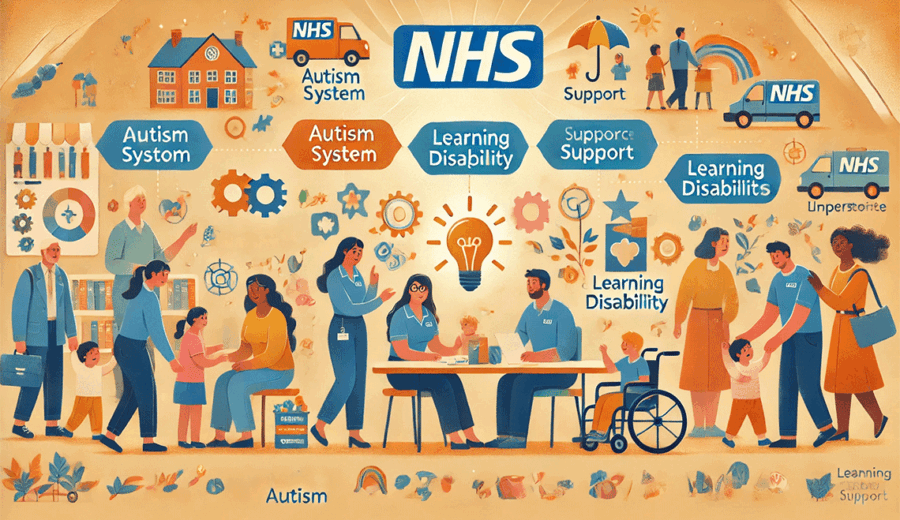
Navigating the NHS for Autism
Navigating the NHS for Autism and Learning Disability Support
Accessing support through the NHS for autism and learning disabilities can seem complex, but understanding the process and available resources can significantly ease the journey. This detailed guide will help parents and caregivers in the UK navigate the NHS system to get the right care and support for their children.
Understanding the Role of the NHS in Autism and Learning Disability Support
The NHS provides a range of services to diagnose, support, and treat individuals with autism and learning disabilities. These services are typically accessed through primary care (e.g., General Practitioners or GPs) and specialized secondary care.
Key Services Provided by the NHS
1. Diagnosis Services
The NHS offers comprehensive diagnostic assessments for autism and learning disabilities. These evaluations are carried out by multidisciplinary teams, including pediatricians, psychologists, speech and language therapists, and occupational therapists.
- For autism: The Autism Diagnostic Observation Schedule (ADOS) and developmental history are key tools used in assessments.
- For learning disabilities: Cognitive and developmental assessments are conducted to determine specific needs.
2. Therapy and Intervention
After diagnosis, the NHS can refer children to therapy services, such as:
- Speech and language therapy to address communication challenges.
- Occupational therapy for sensory and motor skill development.
- Behavioral support programs to enhance social and functional skills.
3. Mental Health Support
Children with autism or learning disabilities may also experience anxiety, depression, or other mental health challenges. The NHS provides access to Child and Adolescent Mental Health Services (CAMHS), which offer tailored support.
4. Specialist Clinics and Services
Some NHS trusts operate specialist autism and learning disability clinics. These centers provide targeted support, including medical assessments, therapy sessions, and family counseling.
Steps to Access NHS Support
1. Recognize the Need for Support
If you notice developmental delays, social interaction difficulties, or learning challenges, it’s essential to seek help early. Document any concerns and milestones to share with healthcare professionals.
2. Visit Your General Practitioner (GP)
The GP is your first point of contact. They will listen to your concerns, perform an initial evaluation, and decide whether to refer your child to a specialist service.
3. Request a Referral for Diagnosis
Your GP can refer you to:
- Community Pediatricians for developmental assessments.
- Speech and language therapists or occupational therapists.
- Autism or learning disability diagnostic teams for a formal assessment.
4. Participate in the Assessment Process
The diagnostic process may take several months and typically involves multiple sessions. Be prepared to provide a detailed developmental history and collaborate with the assessment team.
5. Develop a Support Plan
Once a diagnosis is made, the NHS team will guide you on the next steps, which may include therapy referrals, educational recommendations, or health care plans.
Navigating Education, Health, and Care Plans (EHCPs)
The NHS collaborates with local authorities to provide Education, Health, and Care Plans (EHCPs). An EHCP outlines the specific support a child needs in school and other settings.
How to Apply for an EHCP
- Request an assessment through your local authority.
- Include evidence from NHS professionals, such as diagnostic reports and therapy recommendations.
- Work with your child’s school to identify necessary accommodations.
Support for Families Through the NHS
1. Family Counseling and Training
The NHS offers family support services, including parenting programs and workshops to help parents manage challenges related to autism and learning disabilities.
2. Respite Care Services
For families needing temporary relief, NHS-funded respite care is available in some areas. This service provides short-term care for children, allowing parents to rest or attend to other responsibilities.
3. Accessing Financial Assistance
The NHS provides free services for diagnosis and therapy, but additional resources such as equipment or specialist care might require funding. Families can apply for grants or benefits like Disability Living Allowance (DLA).
Challenges and How to Overcome Them
1. Long Waiting Times
Delays in diagnosis and therapy are common. Consider private assessments if feasible, but ensure they meet NHS standards for recognition.
2. Limited Local Services
Some areas may lack specialized resources. Reach out to regional NHS trusts or explore telehealth options for consultations.
3. Communication with Professionals
Effective communication with NHS staff is essential. Prepare questions, bring documentation, and advocate for your child’s needs during appointments.
Tips for Navigating the NHS System
1. Stay Organized
Keep records of all appointments, reports, and communications with NHS staff. This ensures smooth coordination between services.
2. Build a Network
Connect with other parents, support groups, or charities for guidance and emotional support. They can share insights on navigating NHS services.
3. Use Online Resources
The NHS website and other trusted platforms like the National Autistic Society provide detailed information about available services and processes.
Empowering Families Through the NHS
Navigating the NHS for autism and learning disability support can be challenging, but it is a journey toward empowering your child and family. By understanding the process, seeking guidance, and advocating for your child’s needs, you can access the necessary resources to help your child thrive.





Leave a Reply